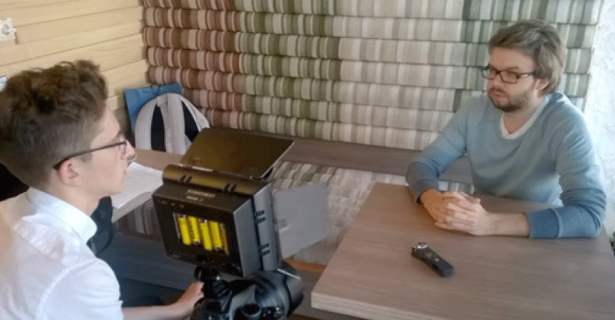Today marks the last day of my stay in Moscow after an intense week of cold calls and meetings. If this project has taught me anything, it's that hard work can really pay off. While we were working off of limited connections, something I had previously thought essential to securing interviews, I've been finding that just sitting down and talking with people can help immensely with securing their interest in helping us in our endeavor. After sitting down with representatives from Open Russia, we were able to secure an interview with Egor Prosvirnin, a Russian ultra-nationalist who heads Sputnik i Pogrom, a popular website which supports the overthrow of the Putin administration and the rejection of Russia's Soviet past. Prosvirnin advocates for the establishment of a white, European Russia with democratic values. He, however, looks favorably towards the annexation of Crimea and the Donetsk and Lugansk's People's Republics in Eastern Ukraine. This was very interesting to me because most who are in favor of Russia's actions in Ukraine look favorably towards the Putin administration as well, however, Prosvirnin explained his support for the annexation deriving from his belief in the superiority of the Russian people rather than any particular support for Putin himself.
Prosvirnin's insights were especially interesting in the context of the interviews we had with others regarding how the West tends to perceive Russians and the Russian identity. We had a chance to sit down with Professors Irina Semenko and Vladimir Pantin of IMEMO who relayed how many people in the West simply do not understand what being Russian means to those of Russian nationality because of the disconnects between the West and the East. They described how the limitations of the Soviet era made it virtually impossible for those in the West to come into contact with Russians and how this lack of contact has continued to impact how the West views Russia into the current era.
On our last day of interviews, I sat down with Aleksei Solomin, an editor at Echo of Moscow, the city's largest radio network. Aleksei was in Crimea during the time of the annexation and described to me how the annexation was incorrectly reported by the West as being a forceful effort by the Russian government to take over the region. He explained to me how there were discussions in the Crimean legislature to leave Ukraine in light of the protests in Kiev and how it was, in fact, pro-Ukrainian forces that came into the region with arms to fend off the Russian supporters of the Crimeans in the region who wanted to secede. Aleksei's perspective was very interesting in that he as an independent journalist rejected the assertions about the annexation many hold to be true in the West. Actually getting to talk with someone who had been there as opposed to the secondhand reports that I had previously been exposed to really opened my eyes to the complexity of the annexation. I'm confident that individuals like Alexei, Professors Semenko and Pantin, and Prosvirnin's will increase the breadth of perspective in our project, and help us truly understand the nature of the annexation.

